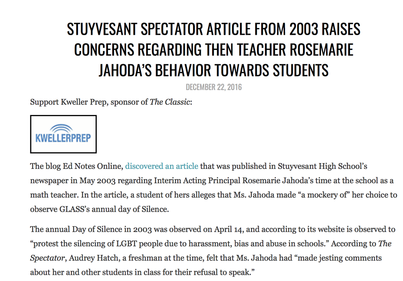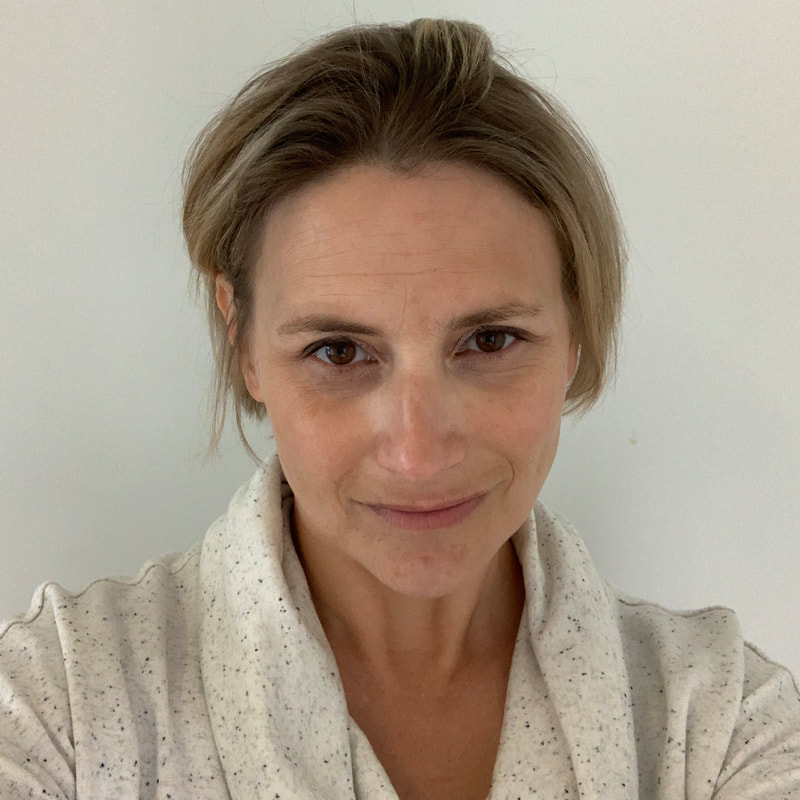 A screenshot of one of the stories reported by Townsend Harris High School's student newspaper, The Classic. Acting as watchdog journalists, these student journalists have written a series of stories about the controversy surrounding the school's interim principal, Rosemarie Jahoda. A screenshot of one of the stories reported by Townsend Harris High School's student newspaper, The Classic. Acting as watchdog journalists, these student journalists have written a series of stories about the controversy surrounding the school's interim principal, Rosemarie Jahoda. One of the most important roles of a free press in a journalistic society is to act as a watchdog, to keep an eye on those in power and to ensure that power is not being misused. Although this role is more prominent among professionals, student journalists willing to put in the necessary time and research can be powerful watchdogs for their communities. In his Poynter article "Watchdog Culture: Why You Need it, How You Can Build it," Butch Ward describes a 2005 conference for media professionals and public service journalism organizations about the importance of creating a watchdog culture in newsrooms. "From the outset," Ward writes, "the group emphasized that newspapers must pursue watchdog journalism in order to carry out their responsibility for public service. There also was broad consensus that the pressure on newsrooms to achieve the highest standards of accuracy and fairness has never been higher." Journalists in 2005 were faced with the aftermath of the 9/11 terrorist attacks, the wars in Afghanistan and Iraq, the Patriot Act and concerns about the Bush administration. It's understandable why major news producers would have felt the need for a focus on watchdog journalism at that time. Journalists in 2017 are facing a very different set of concerns, but the need for a free press to hold the powerful accountable remains critical. This goes beyond overseeing politicians and the White House. "Watchdog journalism is at the heart of a newspaper's commitment to public service," Ward writes. Take a look at the Associated Press Media Editors dynamic list of watchdog reporting, and you'll see stories ranging from disproportionally high rates of punishment for students of color in Illinois to the effects of food waste in Arizona. This type of reporting is difficult even for professionals, but for students, it can feel impossible. Being a watchdog means doing extensive research and reporting over a long period of time — meticulous fact-checking and verifying every piece of information — and students don't have as much time or as many resources as professional journalists. They also may fear censorship from school officials if they bring unsavory information to light. Although most students are legally protected from this kind of censorship, there can be a wide gap between legal rights and school practices. Despite these obstacles, however, student journalists can and should take on the role of watchdogs in their school communities. As reported in Teen Vogue, a growing watchdog in its own right, "The Townsend Harris High School's student newspaper, The Classic, has been actively covering the controversy surrounding the school's interim principal, Rosemarie Jahoda, and has broken a series of stories exposing the principal's alleged inappropriate conduct at closed-door meetings, mistreatment of LGBT students while a math teacher at Stuyvesant High School, and workday 'furniture shopping' for her office, even though she hasn't yet been hired as the permanent principal." These student journalists, with guidance from adviser Brian Sweeney, have made a tangible difference in their community, and their stories have been picked up by national newspapers such as the New York Post and the New York Daily News. How have they done this? Time, hard work and fact-checking. They've weathered accusations of "fake news" by carefully verifying and researching every fact. Reading reporter Kate Dwyer's account of their process shows how professional the amateurs can be. “These girls are sitting on so many stories that they could be writing, but refuse to publish because they can’t confirm them," Sweeney says. "They have documents and pages of interviews and they will only publish what they can verify." The story on the visually impaired Bronx Science student was uncovered by thorough reporting by Sumaita and Mehrose, who looked for non-THHS names on a petition to have Jahoda removed from their school. They figured the people who signed it and didn't have children attending THHS had a reason for doing so. Over their December break, the girls spent every day tracking down potential sources, and found the student's mother on Facebook. Once they had the story, they spent three weeks confirming it and later sent it to the head of the High School News Consortium, she gave them feedback. Granted, most schools are not facing major corruption scandals that warrant national coverage of student reporting. But that doesn't mean the watchdog role is irrelevant — far from it.
Students have unique insight into problems at schools that may go unnoticed by even the most well-intentioned teachers and administrators. They are the ones most likely to see when a policy or practice isn't working or hear about hidden problems like a culture of hazing within a sports program or drugs coming onto campus. The role of a watchdog student journalist is to seek out these problems, investigate them meticulously, verify facts completely and then bring them into the light where adults with power in the community can do something about them. When reporting with integrity and tenacity, these student journalists have the power to fulfill Ward's call to the professionals in 2005: to hold "the powerful accountable to the rest of us...serving the public interest in ways that truly interest the public."
0 Comments
Leave a Reply. |
About“And though she be but little, she is fierce!” -A Midsummer Night’s Dream Archives
December 2020
Categories
All
|

 RSS Feed
RSS Feed